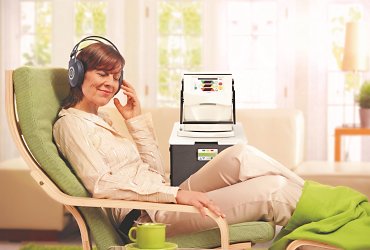Fresenius Helios has published initial results from a study of all COVID-19 patients admitted to Helios hospitals in Germany that has been conducted since the start of the pandemic: Two of every three COVID-19 patents in intensive care in Germany require mechanical ventilation. One-third of ventilated intensive care patients die, compared with one-quarter of non-ventilated intensive care patients. This shows that the clinical course of COVID-19 patients in Germany is as poor as in countries hit harder by the pandemic such as Italy, France, the United Kingdom and Belgium. Helios, supported by the Brandenburg Medical School, started in February to collect and analyze data on COVID-19 patents treated in the Helios’ 86 German hospitals. These and additional findings that Helios makes from the study are expected to help in the development of a treatment for the virus.
Beginning in Q4 2020, Fresenius Kabi will introduce smartlabels with radio frequency identification (RFID) technology for medications frequently used in the operating room in the U.S. The smart label enables hospitals to automatically identify, locate and manage their inventory. The first products in the smartlabel portfolio are anesthesia and analgesia products in prefilled syringes and vials.
The Berlin-based digital health company Curalie, a subsidiary of the Fresenius healthcare group, has entered a cooperation agreement with the “Wir für Gesundheit” quality medical care network and the health insurer Debeka. In the first step, a prevention app through which regular medical check-ups can be carried out, along with other functions, will be added to PlusCard. A supplementary company health insurance that companies can offer to their employees, PlusCard was jointly developed by “Wir für Gesundheit” and Debeka and has been offered since 2014. Additional digital components are planned for the prevention app, including a telemedicine function for the care of chronically ill patients.
Helios Germany has published its first sustainability report. Oriented to the internationally established standards of the Global Reporting Initiative, this 60-page document outlines the four main target groups and areas that Germany’s largest private hospital operator has defined for its sustainability strategy: Patients, employees, the environment and compliance. Along with numerous statistics and examples from Helios Germany hospitals, the report sets out the company’s goals for its future development. Titled ”Für eine gesunde Zukunft” (toward a healthy future), the report is now available in German on www.helios-gesundheit.de. An English version will be published soon.
Fresenius Medical Care North America intends to open more than 100 new transitional care units (TCUs) this year. These units will help people recently diagnosed with kidney failure learn about the treatment options available to them including home dialysis, and become more empowered in managing their own care. TCUs are designed to be a separate space within a dialysis center with staff dedicated to onboarding patients new to dialysis during their first weeks of treatment, assisting patients transitioning between modalities, and supporting individuals returning to dialysis from transplant. Fresenius Medical Care North America has been rapidly opening TCUs, with a total of 65 operating already, in support of its home growth strategy. The company has found that over 50 percent of TCU patients will choose a home dialysis modality.
Following the recent U.S. Food and Drug Administration (FDA) Emergency Use Authorization, Fresenius Kabi Propoven 2% is now available in the U.S. Propoven 2% is a higher concentrated dosage form of propofol compared to Fresenius Kabi’s FDA-approved Diprivan® 1%, providing clinicians with another sedation option for ventilated COVID-19 patients. The higher concentration presentation allows Fresenius Kabi to support more patients through more efficient use of existing manufacturing capacity.
Fresenius Kabi announced today that the U.S. Food and Drug Administration (FDA) has accepted for review the company`s Biologics License Application (BLA) for MSB11455, a biosimilar candidate of Neulasta® (pegfilgrastim)*. This is an important achievement in the development of Fresenius Kabi’s biosimilar pipeline in the US. Fresenius Kabi also received acceptance for review of its regulatory submission for its pegfilgrastim biosimilar candidate from the European Medicines Agency this month. (* Neulasta® is a registered trademark of Amgen)
The European Medicines Agency (EMA) has accepted for review Fresenius Kabi`s Marketing Authorization Application (MAA) for MSB11455, a biosimilar candidate of Neulasta® (pegfilgrastim)*. This is another milestone for Fresenius Kabi following last year`s approval and launch of the company`s adalimumab biosimilar (Idacio®) in Europe. (* Neulasta® is a registered trademark of Amgen)
Fresenius Medical Care, the world’s leading provider of dialysis products and services, is enhancing its home dialysis offering in the company’s Europe, Middle East and Africa (EMEA) region. The now-completed integration in EMEA of the NxStage home dialysis portfolio, following U.S.-based NxStage’s acquisition by Fresenius Medical Care, enables the company to offer even more patients at-home treatment and a wider choice of treatment methods.
Home dialysis offers a number of advantages to patients, above all the freedom to be treated on their own schedule and in the comfort of their own home. During the current difficult situation, this enables them to receive their lifesaving dialysis treatment without having to go out and risk a possible infection with COVID-19.
“Due to the integration of the NxStage portfolio in the EMEA region, we can offer lifesaving dialysis to a growing number of patients in their home environment,” said Dr. Katarzyna Mazur-Hofsäß, Fresenius Medical Care’s Chief Executive Officer for EMEA. “In this way we are expanding treatment options and contributing to continuous care. Our commitment is to be able to offer every person who needs dialysis the right therapy, at the right time, in the right place.”
With home dialysis, the therapy options include home hemodialysis (HHD) and peritoneal dialysis (PD).
The “NxStage SystemOne” from Fresenius Medical Care, an HHD system that is especially easy to operate, allows patients to dialyze more frequently but for shorter periods than in a dialysis clinic. This may bring improved treatment results: The increased dialysis frequency makes improved blood pressure control possible, is associated with faster recovery time after treatment, and helps patients feel better.
It is possible to carry out home dialysis overnight (nocturnal hemodialysis), while the patient sleeps. It can be a slower and longer treatment that more closely resembles healthy kidney function, and therefore can be gentler on the heart. In addition, the removal of toxic metabolic products from the blood is even more thorough (improved middle molecule clearance), which can allow patients to enjoy a less-restrictive diet.
Along with HHD, Fresenius Medical Care offers a broad range of products for continuous ambulatory peritoneal dialysis (CAPD) and automated peritoneal dialysis (APD), which use the body’s own abdominal membrane – the peritoneum – as a natural filter. The product range includes biocompatible dialysis fluids, bag systems, cyclers for automated peritoneal dialysis, and the related bag and tube systems.
Currently about 7 percent of dialysis patients in the EMEA region use home dialysis. Fresenius Medical Care supports both home and in-center dialysis equally, in order to provide the best and most suitable treatment for each individual patient.
Reference papers:
Pierratos A. et al. Nocturnal Hemodialysis: three-year experience. J Am Soc Nephrol 9: 859-868, 1998.
Walker R. et al. Home hemodialysis: a comprehensive review of patient-centered and economic considerations. ClinicoEconomics and Outcomes Research 9: 149-161, 2017.
Fagugli R. et al. Short daily hemodialysis: Blood pressure control and left ventricular mass reduction in hypertensive hemodialysis patients. Am J Kidney Dis 38: 371-376, 2001.
Jaber B. et al. Effect of daily hemodialysis on depressive symptoms and postdialysis recovery time: interim report from the FREEDOM (Following Rehabilitation, Economics and Everyday-Dialysis Outcome Measurements) Study. Am J Kidney Dis 56(3): 531-539, 2010.
Fresenius Medical Care North America is making 150 additional dialysis machines available to U.S. hospitals for the emergency treatment of COVID-19 patients, under the company’s newly established National Intensive Renal Care Reserve. The reserve creates a pool of dialysis machines that can be sent to hospitals on short notice, and nearly doubles the volume of consumables available to perform treatments. The increased demand is a result of many COVID-19 patients requiring renal replacement therapy due to acute kidney injury, and not all hospitals having enough dialysis machines to treat them.
Pagination
- Previous page
- Page 9
- Next page





